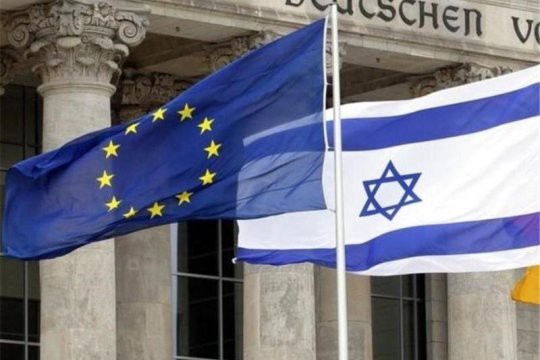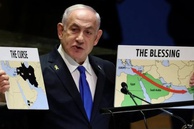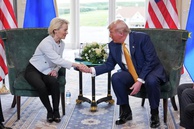Despite Hamas having informed Egypt and Qatar about its agreement to a ceasefire, Israel is preparing a new operation in central Gaza. During a Sunday visit to the Gaza Strip, Israeli Defense Forces (IDF) Chief of Staff Eyal Zamir announced an imminent transition to a new phase of Operation Gideon’s Chariots.
The plan has been criticized both inside Israel and internationally, with the European Union warning Tel Aviv against plans to fully occupy the Gaza Strip and blaming it for the humanitarian catastrophe the territory has been plunged in. Just a couple of years ago, it would have been unimaginable for the EU and the UK, traditionally quite loyal, if not patronizing, towards Tel Aviv's actions against its Arab neighbors, to unleash such harsh criticism. Words like "cynicism," "unacceptable violation of international law," and "actions resembling genocide" are now being hurled from European capitals at Israel, which continues its massacre of Palestinians in the Gaza Strip and the expansion of its borders through the seizure of neighboring territories. Judging by the rhetoric of its former supporters, Tel Aviv has significantly squandered the political capital of sympathy and solidarity from Europeans following the October 7, 2023 Hamas attack and hostage taking. Moreover, the Europeans have reinforced their criticism by concrete measures aimed at convincing Israel to sober up. However, it looks like even on this issue, there is no unity within the EU.
When European Council President Antonio Costa announced in early June that the European External Action Service (EEAS) had been tasked with analyzing the 2000 Association Agreement between the EU and Israel, which not only grants trade preferences, but also enshrines respect for human rights and democratic principles as an "integral element" of cooperation between the two sides, it became clear that Europe's patience was wearing thin. Costa clarified that the EU's diplomatic service would assess whether Israel is fulfilling its obligations under international law. "The situation in the Gaza Strip is, of course, completely unacceptable," the Portuguese official acknowledged. "Watching television and reading newspapers, I think it's not difficult to predict what conclusion would be reached," he added. According to media reports, a coalition of 17 EU member states, led by the Netherlands, has already been formed to review the agreement with Tel Aviv. However, such decisions require unanimous consent by all 27 EU member states, or a qualified majority. This may hardly happen any time soon, though, so Brussels is still mulling its further action.
Meanwhile, on July 23, over 100 international humanitarian organizations warned about an impending mass famine in the Gaza Strip and called for ensuring access to humanitarian aid, which is being blocked by the Israeli army. "People in Gaza are neither alive nor dead; they are walking corpses," said Philippe Lazzarini, the head of the UN Relief and Works Agency for Palestine Refugees in the Near East (UNRWA). According to the Palestinian Ministry of Health, by the end of July, the death toll in the besieged enclave had approached 60,000, with at least 147 people, including 88 children, having already died of starvation.
It was against this backcloth that on July 24, French President Emmanuel Macron announced his intention, extremely painful for Benjamin Netanyahu's government: "True to our historical commitment to a just and lasting peace in the Middle East, I have decided that France will recognize the State of Palestine." Macron promised to officially announce this at the UN General Assembly in September. "Today, it is extremely important to end the war in Gaza and provide assistance to the civilian population," he wrote online. "The French people want peace in the Middle East."
Incensed by Macron’s demarche, Israel’s Prime Minister Benjamin Netanyahu warned that "a Palestinian state in these conditions would be a launch pad to annihilate Israel — not to live in peace beside it.” Defense Minister Israel Katz minced no words calling the French president’s statement a "disgrace and capitulation to terrorism, providing a reward and encouragement to the murderers and rapists from Hamas, who committed the most horrific massacre of the Jewish people since the Holocaust." Washington felt equally offended for its protégé, with Secretary of State Marco Rubio "strongly rejecting" Macron's move, and calling it a "slap in the face" of the victims of the October 7 Hamas attack. He added that Paris' intention to recognize Palestinian statehood was derailing ceasefire negotiations in Gaza by showing to Hamas that its actions had been rewarded. Therefore, the West is far from the unanimity of views it demonstrated during the hey days of Atlantic solidarity. Meanwhile, Macron has received support from fellow Europeans. "I welcome France's recognition of the State of Palestine, along with Spain and other European countries," said Spanish Prime Minister Pedro Sanchez. "Together we must defend what Netanyahu is trying to destroy. The two-state solution is the only solution." Eleven of the 27 EU member states have already recognized Palestinian statehood, including Spain, Romania, Sweden, Ireland, and Bulgaria. Before long, Britain and Canada followed France's example, drawing sharp criticism from the US and Israel. Donald Trump even threatened Canada that its recognition of Palestinian statehood would "greatly complicate" a bilateral tariff agreement. France, Britain, and Canada could soon become the first G7 countries to recognize Palestine. This will be another sticking point in the West’s traditionally coordinated stand on international issues.
During the past few weeks, several European leaders have hardened their stance towards Israel. Following Macron, British Prime Minister Keir Starmer stated that "the suffering and hunger occurring in the Gaza Strip are inexcusable" and called statehood an "inalienable right of the Palestinian people." In a surprise move, Italian Prime Minister Giorgia Meloni strongly condemned the Israeli attack on a Catholic church in the Gaza Strip, which left three people dead. In her most critical comments to date, Meloni called the killing of civilians in Gaza "unacceptable." It should be noted, however, that Rome still has not recognized Palestine. But perhaps the most harsh and frank criticism came from the European Commission’s Executive Vice-President Teresa Ribera, who in an interview with Politico stated that Israel's actions in the Gaza Strip are "very similar" to genocide. The European Commission as an institution has not yet used the term "genocide" to qualify Israel's actions, but Teresa Ribera still managed to say what she wanted.
Ribera is a supporter of decisive measures to sober up Israel and believes that it is necessary to move from rhetoric to concrete actions to force Netanyahu to remove obstacles to humanitarian aid in the devastated enclave, specifically by suspending the Association Agreement between the EU and Israel. So far, the European Commission has only proposed suspending, though only partially, Israel's participation in its flagship research and development program, Horizon Europe. However, even this initiative was blocked by Germany and three other countries.
Many are hesitant to “come to blows” with Tel Aviv, and, therefore, with its American sponsors, though. Still, with the absence of necessary consensus, some countries are acting on their own. Thus, small Slovenia became the first EU country to ban any arms trade with Israel from August 1. Ljubljana announced that since the Union has not yet taken any measures against Israeli actions in Gaza, it had decided to go it alone. The Slovenian government also banned the transit of weapons to or from Israel via its territory. This is an essentially symbolic demarche, as Slovenia has not issued any permits for the export of military products to Israel since October 2023. But a good beginning is half the battle - Ljubljana said it would come up with similar measures in the coming weeks. Slovenia has become one of the harshest critics of Israel in Europe. It previously banned entry to the country for two far-right Israeli ministers, the first such instance in the EU, and the Netherlands recently followed suit. The Dutch caretaker government banned entry to the country for Israeli Finance Minister Bezalel Smotrich and National Security Minister Itamar Ben-Gvir for their "propaganda of ethnic cleansing in the Gaza Strip." In a letter to parliament, Dutch Foreign Minister Wopke Hoekstra announced that both Israelis would be considered "undesirable aliens in the Schengen system." The Netherlands also announced that it supports suspending the trade chapter of the EU agreement with Israel.
Sweden also called for suspending the trade part of this agreement, with Prime Minister Ulf Kristersson stating that “economic pressure on Israel must be increased. The Israeli government must allow unlimited humanitarian aid to Gaza." This intension is fully shared by Sweden’s neighbor Norway. Although not an EU member, Norway is part of the European Economic Area and a member of the European Free Trade Association. In a highly painful decision for the Israeli economy. Norway’s Norges Bank Investment Management (NBIM), the largest sovereign wealth fund around, which owns about 1.5 percent of all global stocks, decided to divest from 11 Israeli companies and terminate contracts with all managers in Israel due to the situation in the Gaza Strip. In its August 11 statement, the fund says that as of the end of June, it had investments in 61 Israeli companies. Now, 11 of them have been removed from the list "due to unacceptable risk and serious ethical violations." According to the newspaper Zeit, the Norwegian government has initiated an ethical review of investments related to Israel's actions, including NBIM's participation in financing Bet Shemesh Engines, which services Israeli warplanes.
Even Germany, which has traditionally been loyal to Israel, was forced to resort to pressuring Tel Aviv. In a surprise move, Chancellor Friedrich Merz suspended the sale of German weapons to Israel "used in Gaza," even though this put him in a very delicate position, as according to German foreign policy norms, given its difficult past, Germany bears a "special historical responsibility" for the security of the Jewish state. The Chancellor's decision caused consternation among local conservatives, with several prominent colleagues within his very own CDU voicing their dissatisfaction.
"Israel's security has been and remains a matter of Germany's national interests,” Boris Rhein, the Prime Minister of Hesse said. “Therefore, we must continue to arm Israel to defeat Hamas and end terrorism,” he added.
Some conservatives generally regarded Merz's move as yet another illustration of his tendency to suddenly change course on key issues. In an interview with ARD television, Merz tried to justify himself. "The principles of the German policy towards Israel remain unchanged," he emphasized.
It seems that Merz had no other choice, with external pressure on him mounting fast as the plight of Palestinians in the enclave worsened. Many European countries expected a concrete response from Berlin demanding that it stop covering up Netanyahu's actions, which provoked a humanitarian catastrophe, and not to block the European Commission's proposal to partially suspend the Association Agreement. The Commission openly accused Tel Aviv of violating international humanitarian law. Germany simply could not but react.
The situation is rapidly changing now, with Italy, which, along with Germany, opposed the European Commission's plan, also revising its position. Politico reported, citing EU diplomats, that several countries are getting "impatient" and want the Commission to go further and suspend key trade links with Israel.
Currently, all attention is on Israel's announced plan for the complete takeover of the Gaza Strip. The UN has called for its immediate cancellation. The plan includes the demilitarization of the sector and the creation of an Israeli-controlled administration there, which, according to Prime Minister Netanyahu, will not be associated with either Hamas or the Palestinian Authority. In recently televised remarks, Netanyahu spoke about his cherished idea of a "Greater Israel," implying the inclusion of Palestinian lands and territories belonging to Jordan and Egypt.
The anticipated decision was immediately condemned by the EU. “The EU rejects any territorial change that is not part of a political agreement between involved parties. So annexation of territory is illegal under international law,” the European Commission spokesperson Anitta Hipper said. European Commissioner for Crisis Management Hadja Lahbib underscored that a complete Israeli takeover of Gaza would have catastrophic consequences: mass casualties, destruction of infrastructure, and risks to the hostages themselves. European Commission Vice-President Teresa Ribera openly called Netanyahu's plan an "unacceptable provocation."
Demonstrably ignoring this criticism, Israeli Finance Minister and leader of the far-right Religious Zionism party, Bezalel Smotrich (the one who was not allowed into the Netherlands – author's note), announced on August 14 the government's intention to build 3,400 new homes in the West Bank, in the so-called E1 zone, which connects major cities controlled by the Palestinian National Authority - Ramallah and Bethlehem. Construction in this area will effectively cut off the West Bank from occupied East Jerusalem and split the Palestinian territories in the West Bank into two parts: northern and southern. According to the minister, this would “bury the idea of a Palestinian state,” and there will be "nothing and no one to recognize." Speaking at a news conference, Smotrich also stated that this land was given to the Jews by God. "This is Zionism at its best—building, settling and strengthening our sovereignty in the Land of Israel.”
Such defiance would have been impossible without US patronage, of course. The State Department has already stated that the stability of the West Bank ensures Israel's security and is consistent with the Trump administration’s goal of achieving peace in the region. Meanwhile, the UN has strongly urged Israel to refrain from this plan. A statement issued by the European External Action Service says that these "unilateral decisions" exacerbate the already tense situation in the region and further undermine any possibility of achieving peace. In a similar statement made on August 15, a German Foreign Ministry representative noted that Berlin recognizes only those border changes that were agreed upon by Israel and the Palestinians in 1967. The German government called on the Israeli government to abandon the construction of new settlements in the West Bank, as it violates international law and the relevant UN Security Council resolutions. This position is shared also by the UK. (By the way, in June, Smotrich came under British sanctions for "repeated incitement to violence against Palestinian communities.")
It looks like Israel has no intention to stop, though. Last week, news agencies reported that Tel Aviv is negotiating with Ethiopia, Libya, Indonesia, and South Sudan to accept Palestinians who are to be relocated from the Gaza Strip. "In exchange for accepting a part of the more than 2 million residents of Gaza, these countries expect significant financial and international compensation," CNN reported. The Associated Press wrote about similar negotiations held this past spring when the media actively discussed Donald Trump's utopian idea of creating a flourishing paradise resort on Palestinian lands under Washington's aegis, with the eviction of the current indigenous population to other countries. Although neighboring Arab countries predictably rejected the idea, it is still alive. Last month, Mossad chief David Barnea visited Washington asking for US help in persuading other countries to accept hundreds of thousands of Gazans. If Tel Aviv and Washington really start building a "paradise Middle Eastern Riviera," this territory may quickly turn a "geopolitical hell" for the entire region.
read more in our Telegram-channel https://t.me/The_International_Affairs

 18:18 20.08.2025 •
18:18 20.08.2025 •



























